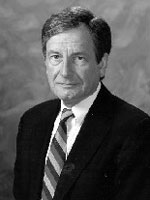
| Date | Lecture |
|---|---|
| Wednesday, March 6, 2002 | “War: Ethics vs. Strategy, Ethics and Strategy?” |
| Thursday, March 7, 2002 | “Strategy, Ethics, and the ‘War on Terrorism’” |
In the summer of 1998, Dr. Pierce was appointed as the first director of the Center for the Study of Professional Military Ethics at the U.S. Naval Academy in Annapolis, Maryland.
Since 1985, he had been Professor of Military Strategy at the National War College in Washington, D.C., where he taught courses in military strategy, the use of military force, civil-military relations, ethics, national security policy, and national security policymaking.
Prior to joining the War College faculty, Dr. Pierce was a defense correspondent for NBC News. Before that, he was Deputy Director of the Strategic Concepts Development Center, an in-house think tank established by Defense Secretary Casper Weinberger. He also served as Assistant to the Secretary of Defense, writing speeches, Congressional testimony, and the Fiscal Year 1982 Annual Report for Secretary Harold Brown. Before moving to the Defense Department, he was with the U.S. Arms Control and Disarmament Agency.
At various times, he has been a consultant to the Office of the Secretary of Defense, the U.S. Arms Control and Disarmament Agency, Cambridge Survey Research, Inc., the Kennedy Institute of Politics at Harvard University, the John F. Kennedy Library Corporation, and SRI International. He was Assistant to the President of the University of Massachusetts, Robert C. Wood.
From 1985 to 1990, he was a Visiting Professorial Lecturer at the George Washington University, teaching graduate-level courses in National Security Policy, National Security Policy-Making, and Defense Policy and Program Analysis: Nuclear Issues. From 1987 to 1992, he was a Visiting Lecturer at the University of Virginia, where he taught The Role of Military Force in International Relations. In 1996, he was an adjunct professor at UCLA=s Washington program, teaching a course in national security policy and the use of military force.
He is a member of the Inter-University Seminar on Armed Forces and Society, the Association for Practical and Professional Ethics, and the International Studies Association. In 1985 he participated in the MIT/Harvard Summer Program on Nuclear Weapons and Arms Control. During 1987-88 he was a Fellow in MIT=s Seminar XXI program. In 1991 he was selected for a Pew Faculty Fellowship in International Affairs, and in 1994 he was chosen to participate in a Carnegie Council faculty summer institute on Teaching Ethics and International Affairs, funded by the National Endowment for the Humanities. Also in 1994 he became one of the first two Americans to become an auditeur of the French Institut des Hautes Etudes de Defense Nationale.
In April 2001, Dr. Pierce delivered the keynote address at the Fourth Annual James Bond Stockdale Leadership and Ethics Symposium at the University of San Diego. In March 2002, he gave the Fleet Admiral Chester W. Nimitz Memorial Lectures in National Security Affairs at the University of California, Berkeley.
Dr. Pierce is a graduate of the Catholic University of America in Washington, D.C. with a major in politics, and he holds an M.A. and a Ph.D. in political science from Tufts University in Medford, Massachusetts.
Among his publications are “Just War Principles and Economic Sanctions,”Ethics & International Affairs, Volume 10, 1996; a chapter on press coverage of the air campaign in the 1993 Gulf War Power Survey, sponsored by the Secretary of the Air Force; “Crisis Management in the White House and the Pentagon,” in Preston Niblack, editor, Managing Military Operations in Crises (RAND, 1991); “The Department of Defense and Media Politics,” in David C. Kozak and James M. Keagle, editors, Bureaucratic Politics and National Security (Lynne Riener Publishers, 1988); “The Strategic Defense Initiative: European Perspectives,” in Catherine M. Kelleher and Gale A Mattox, editors, Evolving European Defense Policies (Lexington Books, 1986); and “Issues Facing the New Administration,” in the AEI Foreign Policy and Defense Review, published by the American Enterprise Institute in 1981.